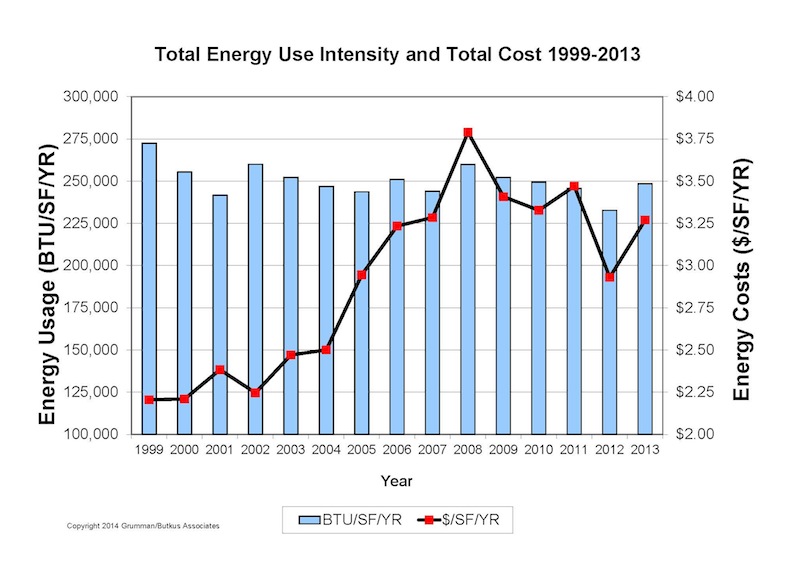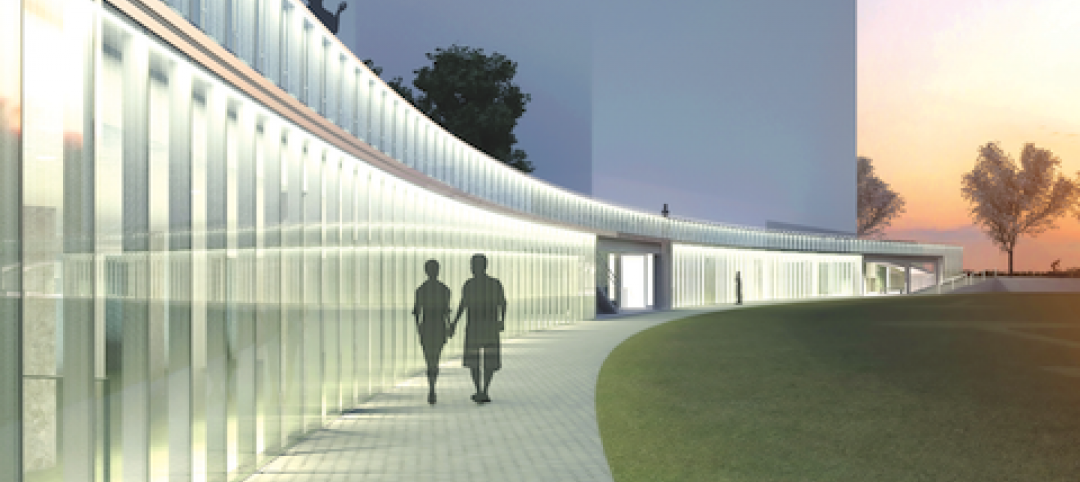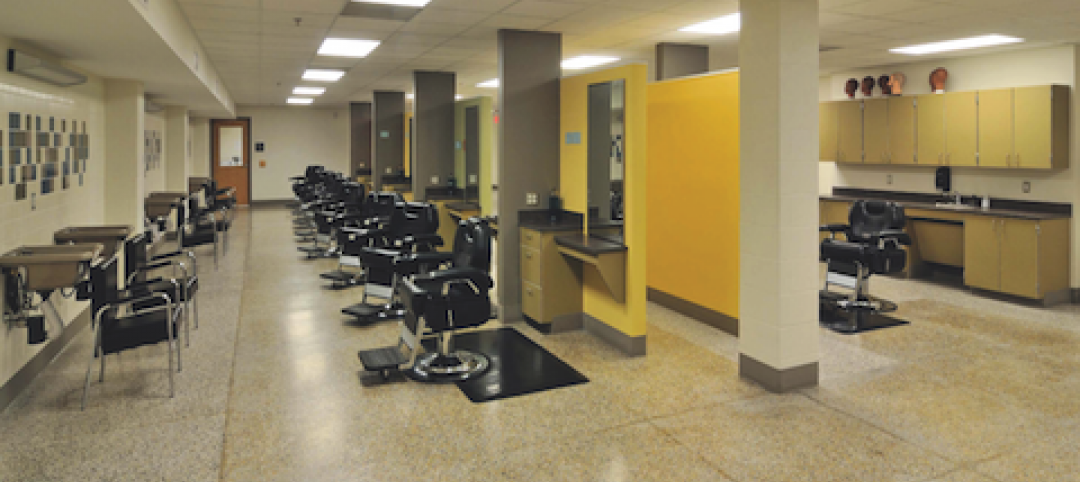Grumman/Butkus Associates (G/BA), a firm of energy efficiency consultants and sustainable design engineers, has released the results of its 2014 Hospital Energy and Water Benchmarking Survey, focusing on healthcare facilities’ resource usage trends and costs for calendar year 2013.
Since the survey was initiated 20 years ago, hospitals’ overall fossil fuel use has trended downward, but electricity use isn’t declining much. The average combined Btu/ft2 for facilities in the survey (electricity plus gas/steam) was 248,456, at a cost of $3.27/sf, compared with 235,731 Btu/sf and $3.09/sf in the 2013 survey (2012 data). Harsh Midwestern winter weather patterns undoubtedly had an adverse effect on energy consumption for hospitals participating in the 2014 survey.
Carbon footprint results have stayed fairly steady over time, at about 60 pounds of CO2 equivalent per sf per year. Water use is gradually declining, currently averaging just over 50 gallons per square foot per year (compared with nearly 70 gallons/sf/year a decade ago).
 Hospitals’ energy costs per square foot (red boxes) have fluctuated greatly since 1999. Energy use intensity (Btu/sf/year) has drifted slightly downward but rose fairly sharply in 2013, probably due to inclement weather. ©2014 Grumman/Butkus Associates.
Hospitals’ energy costs per square foot (red boxes) have fluctuated greatly since 1999. Energy use intensity (Btu/sf/year) has drifted slightly downward but rose fairly sharply in 2013, probably due to inclement weather. ©2014 Grumman/Butkus Associates.
“Hospitals are under tremendous pressure to reduce operating costs,” says G/BA Chairman Daniel L. Doyle. “Reducing energy and water usage not only helps hospitals cut operating costs, but also helps them reduce the environmental impact of their operations.”
The survey has provided a free annual benchmarking resource since its initial release in 1995. Hospitals are invited to participate without charge by submitting responses to a short list of questions. Information for this edition, covering calendar year 2013, was provided by 102 hospitals located in Illinois (54), Wisconsin (29), Michigan (7), Minnesota (4), Indiana (3), and several other states.
“Hospitals have been investing in efficiency measures and making progress, but have much further to go," says Doyle “Electrical energy reduction measures such as lighting retrofits are being offset by the introduction of more and more electronic imaging equipment and fully digital recordkeeping. Though some of the low-hanging fruit is gone, there are still many cost-effective opportunities remaining for reducing energy usage and costs. The downward trend in water usage reflects a movement to eliminate city-water-cooled equipment, as well as the use of low-flow and occupancy-based plumbing fixtures. Again, there is still much room for improvement.”
Full results and analysis, as well as information about participating in the 2015 survey, are available at the firm’s website: http://grummanbutkus.com/why-we-excel/hospital-energy-water-survey. For additional information, contact Doyle (ddoyle@grummanbutkus.com) or Julie Higginbotham (jhigginbotham@grummanbutkus.com).
Related Stories
| Oct 13, 2010
Prefab Trailblazer
The $137 million, 12-story, 500,000-sf Miami Valley Hospital cardiac center, Dayton, Ohio, is the first major hospital project in the U.S. to have made extensive use of prefabricated components in its design and construction.
| Oct 13, 2010
Hospital tower gets modern makeover
The Wellmont Holston Valley Medical Center in Kingsport, Tenn., expanded its D unit, a project that includes a 243,443-sf addition with a 12-room operating suite, a 36-bed intensive care unit, and an enlarged emergency department.
| Oct 13, 2010
Hospital and clinic join for better patient care
Designed by HGA Architects and Engineers, the two-story Owatonna (Minn.) Hospital, owned by Allina Hospitals and Clinics, connects to a newly expanded clinic owned by Mayo Health System to create a single facility for inpatient and outpatient care.
| Oct 13, 2010
Maryland replacement hospital expands care, changes name
The new $120 million Meritus Regional Medical Center in Hagerstown, Md., has 267 beds, 17 operating rooms with high-resolution video screens, a special care level II nursery, and an emergency room with 53 treatment rooms, two trauma rooms, and two cardiac rooms.
| Oct 13, 2010
Cancer hospital plans fifth treatment center
Construction is set to start in December on the new Cancer Treatment Centers of America’s $55 million hospital in Newnan, Ga. The 225,000-sf facility will have 25 universal inpatient beds, two linear accelerator vaults, an HDR/Brachy therapy vault, and a radiology and imaging unit.
| Oct 13, 2010
New health center to focus on education and awareness
Construction is getting pumped up at the new Anschutz Health and Wellness Center at the University of Colorado, Denver. The four-story, 94,000-sf building will focus on healthy lifestyles and disease prevention.
| Oct 13, 2010
Community center under way in NYC seeks LEED Platinum
A curving, 550-foot-long glass arcade dubbed the “Wall of Light” is the standout architectural and sustainable feature of the Battery Park City Community Center, a 60,000-sf complex located in a two-tower residential Lower Manhattan complex. Hanrahan Meyers Architects designed the glass arcade to act as a passive energy system, bringing natural light into all interior spaces.
| Oct 12, 2010
Holton Career and Resource Center, Durham, N.C.
27th Annual Reconstruction Awards—Special Recognition. Early in the current decade, violence within the community of Northeast Central Durham, N.C., escalated to the point where school safety officers at Holton Junior High School feared for their own safety. The school eventually closed and the property sat vacant for five years.
| Sep 13, 2010
Palos Community Hospital plans upgrades, expansion
A laboratory, pharmacy, critical care unit, perioperative services, and 192 new patient beds are part of Palos (Ill.) Community Hospital's 617,500-sf expansion and renovation.
| Sep 13, 2010
China's largest single-phase hospital planned for Shanghai
RTKL's Los Angles office is designing the Shanghai Changzheng New Pudong Hospital, which will be the largest new hospital built in China in a single phase.

















